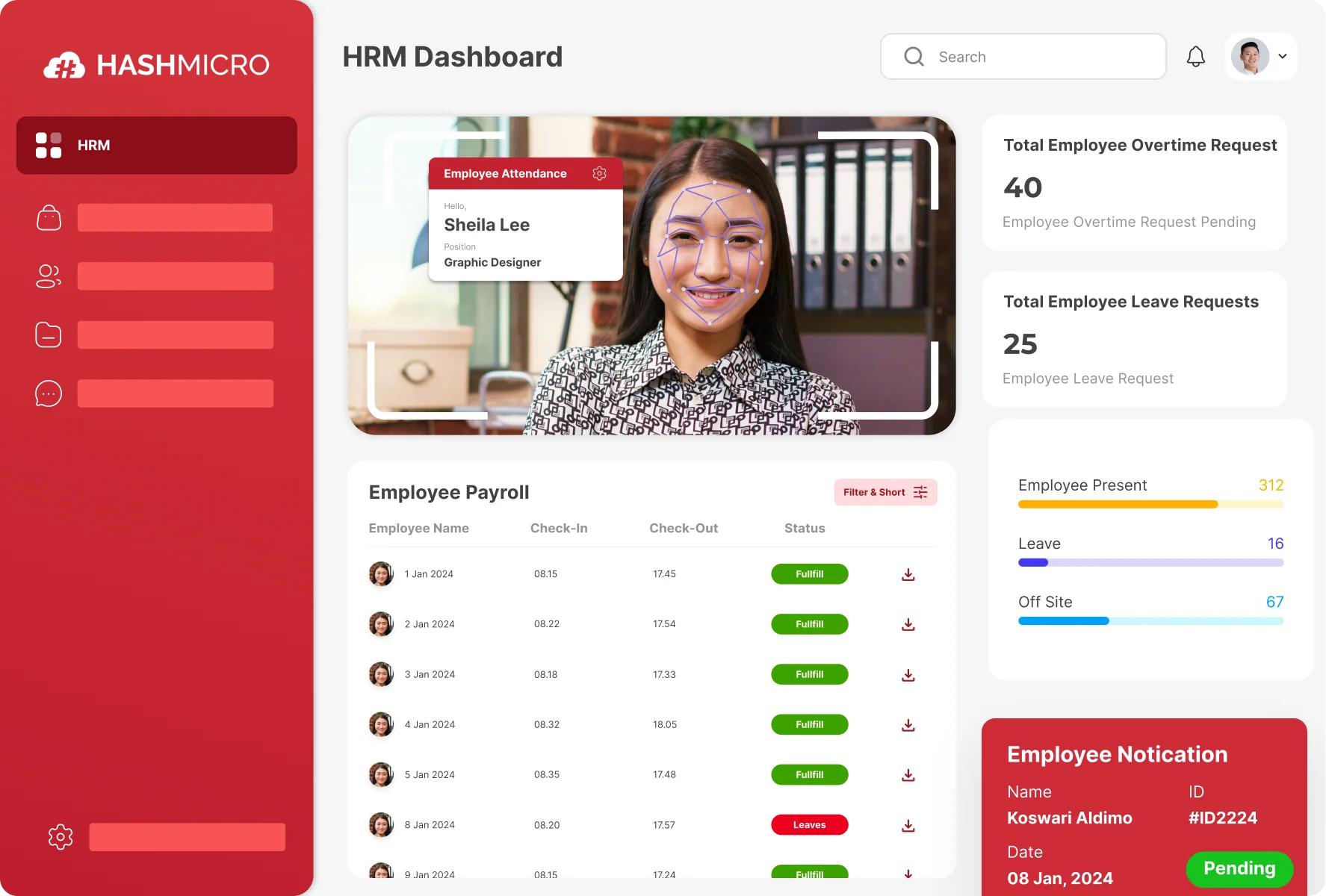Performance appraisal—whether you love it or dread it, it’s a workplace staple. This process evaluates employee performance, celebrates achievements, and identifies improvement areas, yet often evokes mixed feelings.
For some, appraisals are an opportunity to shine and showcase their contributions. For others, it can feel like judgment day, bringing anxiety and uncertainty. These mixed emotions highlight the need for a balanced approach to performance evaluations.
The real question is: Are performance appraisals truly effective? HashMicro HRM offers tools to streamline and enhance the appraisal process, making it more effective and less daunting.
In this article, we’ll explore the strengths and weaknesses of performance appraisals and discuss ways to enhance their effectiveness.
Key Takeaways
|
What is a Performance Appraisal?
A performance appraisal is a systematic evaluation of an employee’s job performance and contribution to the company. Often referred to as an annual review or performance review, this process examines skills, achievements, and areas needing improvement. It plays a crucial role in identifying top performers who drive company growth and helps allocate resources for raises and bonuses.
Companies utilize performance appraisals to provide feedback, determine pay raises or bonuses, and sometimes make decisions about employment status. These reviews typically take place annually, semi-annually, or quarterly. Consequently, they provide a structured opportunity for both employees and managers to discuss performance and set future goals.
Moreover, performance appraisals are not solely about evaluating past performance; they also serve as a tool for planning future development. By understanding an employee’s strengths and areas for growth, managers can offer support through clearer instructions, training opportunities, or additional resources to help employees succeed.
Types of Performance Appraisal
Performance appraisals can be conducted using various methods beyond the traditional top-down approach. Here are some alternatives that provide a more comprehensive evaluation:
-
Self-Assessment
Employees evaluate their own performance, offering insights into their achievements and areas for improvement. This method encourages self-reflection and personal accountability.
-
Peer Assessment
Colleagues provide feedback on an individual’s contributions, offering a broader perspective on teamwork and collaboration. This can help identify strengths and areas for development from a peer’s viewpoint.
-
360-Degree Feedback
This method combines input from the employee, supervisor, and peers, providing a well-rounded view of performance. It can also include feedback from external stakeholders like clients or suppliers for a more holistic assessment.
-
Negotiated Appraisal
A mediator facilitates the process, allowing the employee to present first and focus on strengths before addressing areas for improvement. This approach promotes open dialogue and mutual understanding.
Additional methods include:
- 720-Degree Feedback: Expands on 360-degree feedback by including external stakeholders such as customers and investors, offering a comprehensive view of performance from all angles.
- Assessment Center Method: Employees are evaluated through activities like simulations and role-playing, focusing on skills like communication and emotional intelligence.
- Behaviorally Anchored Rating Scale (BARS): Compares employee behavior to specific performance examples tied to ratings, providing clear standards for evaluation.
- Management by Objective (MBO): Employees and managers collaborate to set goals and track progress, ending with an evaluation of goal achievement.
- Performance Tests and Observations: Skills and knowledge are assessed through tests or problem-solving challenges, offering objective measures of capability.
- Project Evaluation Review: Appraisals are conducted at the end of each project instead of yearly, providing timely feedback on project-specific performance.
- Rating Scales: Employees are rated on traits like dependability and initiative, using scales ranging from Excellent to Poor.
These diverse methods allow companies to tailor their appraisal processes to fit their unique culture and needs, ensuring a more effective evaluation of employee performance.
What is Performance Appraisal Used For?
Performance appraisals serve as a tool to evaluate how well an employee has performed over a specific period. Understanding the performance appraisal meaning is crucial, as it highlights strengths and pinpoints areas for growth, aiming to enhance future performance. For employees, appraisals provide clarity on their achievements and areas needing improvement, fostering personal development.
Managers use these evaluations to understand employee needs and offer support, whether through clearer instructions, training opportunities, or additional resources. For companies with large workforces, performance management software can assist in documenting and selecting appraisal methods, ensuring consistency and efficiency.
Benefits of Performance Appraisal
When executed effectively, performance appraisals can significantly boost employee morale and engagement. By utilizing various performance appraisal methods, they set clear expectations, motivate employees to perform at their best, and encourage commitment. Open communication during appraisals allows employees to voice concerns, share ideas, and feel valued, leading to a more motivated and productive workforce.
Performance appraisals also play a crucial role in succession planning by identifying high-potential employees who are ready for advancement. Through regular evaluations, managers can pinpoint individuals with the skills and drive needed for future leadership roles. This proactive approach ensures that the organization is prepared for leadership transitions, fostering a strong talent pipeline and securing the company’s long-term success.
When Should Performance Appraisal Take Place?
Performance management is an ongoing process that extends beyond annual reviews. Regular check-ins between managers and employees are crucial for setting clear goals and tracking progress. These interactions provide opportunities for immediate feedback, allowing employees to adjust their efforts and stay aligned with company objectives, which can ultimately influence their take home pay.
In addition to informal meetings, formal performance appraisals occur at specific intervals, such as annually, semi-annually, or quarterly. A performance appraisal form is often used to guide these evaluations, offering a platform to discuss achievements, challenges, and future goals, often supported by performance appraisal examples.
By maintaining a consistent appraisal schedule, companies can ensure that employees receive timely feedback and support, fostering a culture of continuous improvement and development. This regularity helps in aligning individual performance with organizational goals, ultimately contributing to the company’s success and potentially impacting take home pay.
Criticisms Against Performance Appraisal
Despite their intended benefits, performance appraisals often face criticism. One major challenge is distinguishing between individual performance and the overall performance of the organization. If the appraisal system doesn’t align with the company’s culture, it can backfire. Other common issues include:
- Lack of trust in the system leads to tension between employees and supervisors.
- Unrealistic goals that demotivate employees or push them toward unethical behavior.
- Concerns about merit-based rewards being overshadowed by other factors.
- Potentially unfair evaluations based on likability rather than actual achievements.
- Biased raters who skew results based on personal preferences.
These challenges underscore the importance of designing fair and effective appraisal systems that truly benefit both employees and the organization.
Also read: ERP Software for Performance Appraisal and Business Optimization.
Simplify Appraisals and Empower Employees with HashMicro HR Software
Managing performance appraisals doesn’t have to be a daunting task. With HashMicro HR Software Malaysia, you can streamline the entire process, making it both efficient and fair. This comprehensive system allows you to monitor objectives, conduct reviews, and track employee advancement all in one centralized platform.
The software is designed to ensure that each evaluation aligns with both personal and organizational goals, recognizing employees’ hard work and contributions. By simplifying the appraisal process, HashMicro HR Software helps employees understand their performance metrics and areas for improvement, fostering a transparent and supportive work environment.
Equipped with advanced features, this software not only manages performance appraisals but also addresses all HR-related needs, from attendance and payroll to recruitment and learning management. Key features include:
- KPI and OKR Tracking: Effectively monitor employee performance with measurable and goal-oriented indicators.
- 360-Degree Feedback: Gather comprehensive input from managers, peers, and external stakeholders for a balanced review.
- Self and Multi-Manager Evaluation: Combine self-assessments with reviews from multiple managers for a thorough appraisal.
- Nine-Box Matrix Analysis: Categorize employees based on performance and potential to identify strengths and growth opportunities.
- Development and Training Plans: Create personalized recommendations for skill development based on appraisal insights.
- Career Path Suggestions: Provide tailored career guidance that aligns with employee aspirations and organizational goals.
With HashMicro HR Software, managing performance appraisals becomes a seamless process, empowering both employees and managers to focus on growth and development.
Conclusion
Performance appraisals are essential for evaluating employee performance, recognizing achievements, and identifying areas for growth. While they offer significant benefits, appraisals must be carefully designed to avoid biases and ensure they contribute positively to both individual and organizational development.
With HashMicro HR Software, managing performance appraisals becomes straightforward and stress-free for both employees and managers. The system centralizes all aspects of the appraisal process, from tracking goals to reviewing progress, ensuring evaluations are fair and meaningful.
Beyond appraisals, handles everything from payroll software Malaysia to recruitment and training programs HashMicro HRIS can do it, acting as an all-in-one solution for your HR needs. This comprehensive approach allows you to focus on building a happier, more productive team.
Why not explore the benefits for yourself? Try the free demo today and see how HashMicro can transform your HR processes and support your leadership transition strategy and talent pipeline development.

FAQ about Performance Appraisal
-
What questions are asked in a performance appraisal survey?
Performance appraisal surveys typically ask about an employee’s achievements, areas for improvement, and goal alignment. They may also include questions about teamwork, communication skills, and overall job satisfaction to gain a comprehensive view of performance.
-
What are good performance review questions?
Good performance review questions focus on specific achievements, challenges faced, and future goals. They should encourage employees to reflect on their contributions, seek feedback, and discuss development opportunities to enhance their performance.
-
What are the rules for performance appraisals?
Performance appraisals should be fair, consistent, and aligned with company objectives. They must be conducted regularly, provide constructive feedback, and ensure transparency to foster trust and development within the organization.


























